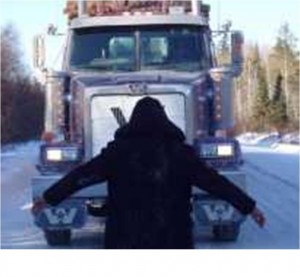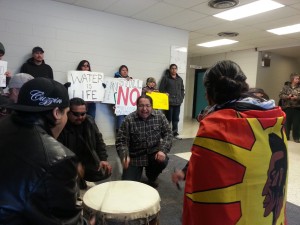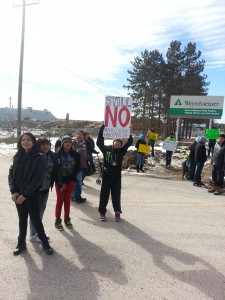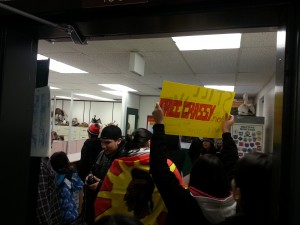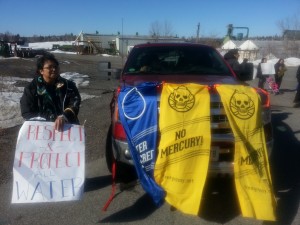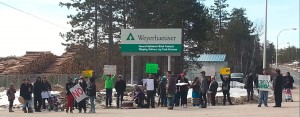Grassroots Grassy Narrows people in Kenora. No logging in Grassy Narrows Territory.
Grassroots people from Grassy Narrows First Nation are demonstrating to remind the Province and Logging Industry that Grassroots People from Grassy Narrows remain firm in their commitment to protect the land from industrial logging.
Grassy Narrows First Nation holds logging protest in Kenora
Protestors demonstrate against clear cut logging on traditional lands
Protesters rally against logging in Kenora
Grassy Narrows Protestors Remain Firm in Message:
No Logging in Grassy Narrows Territory
FOR IMMEDIATE RELEASE
March 16, 2015
Youth and Elders joined by Grassy Narrows Drum Groups for public demonstrations at Weyerhaeuser, MNR, and Kenora Forest Products
Kenora—Today, Members of Grassy Narrows First Nation—Youth groups, Band Councilors, Drum Groups, Elders and others—are engaging in a multi-stage protest against logging in their territory.
People from Grassy Narrows First Nation are demonstrating to remind the Province and Logging Industry that Grassroots People from Grassy Narrows remain firm in their commitment to protect the land from industrial logging, and to demand that the Province remove all lands in Grassy Narrows Traditional Territory from the Ministry of Natural Resources and Forestry’s (MNRF) Whiskey Jack Forest Management Unit, and that Weyerhaeuser and Kenora Forest Products (KFP) publicly commit to not taking any wood from Grassy Narrows Traditional Territory.
The Grassroots People of Grassy Narrows have always opposed logging because of the damage it does to the land and in turn, to their ability to live culturally as Anishinabe People.
“Our land is our culture, and traditions as a people,” says Randy Fobister, a veteran Band Councilor. “When the land is compromised in any way, our culture and traditions will be compromised.”
“We look to the youth,” says Fobister, who is one of the organizers of today’s demonstration. “They are the future who will continue to strengthen the culture and traditions.”
Grassy Narrows Youth have always been at the forefront of the movement to protect our land and culture, including playing a key role in the 12 year old blockade against logging on the Territory. Grassy Narrows Youth have a strong presence today, too.
Grassy Narrows has been opposing the Ministry of Natural Resources and Forestry’s (MNRF) plans for logging in Grassy Narrows Traditional Territory since before the current Forestry Management Plan (FMP) was initiated. In March of last year, the Grassy Narrows Youth Group released a statement rejecting the plan, as did the Band’s Chief and Council.
Despite the fact that this year’s ‘Annual Work Schedule’ for the FMP were released last week and indicate that no clearcutting will be happening this year on Grassy Narrows Territory, for the second year in a row, the ten year clearcut plan—still in its initial phase—has yet to be altered to reflect people from Grassy Narrows’ clear refusal to allow industrial logging to occur within our territory. The ten year FMP continues to plan for extensive clearcut logging throughout the Territory, and an annual threat of widespread industrial logging still remains over the heads of the People of Grassy Narrows.
Today, Grassroots People from Grassy Narrows are demanding that MNRF remove all cut blocks within Grassy Narrows Traditional territory from the long term FMP for the Whiskey Jack Forest.
“The trees, like the water, are sacred,” says Brenda Kokokopenace, an Anishinabe Elder from Grassy Narrows. “We have a duty to protect Mother Earth, and that duty is sacred, too,” she says.
“It is good to see the youth standing up for the land,” KoKoKopenace says. “It shows they know who they are and that they can wake up the people who have lost that connection.”
Before arriving at the Regional MNRF offices in Kenora, the first stop on today’s tour is at the Weyerhaeuser Mill on Jones Road, where an overflowing woodlot (as well as MNRF’s own numbers) disprove Weyerhaeuser’s claim to need wood sourced from Grassy Narrows Traditional Territory. Weyerhaeuser has been a target of Grassy Narrows protests before, as well as of international divestment and boycott campaigns initiated by Grassy Narrows.
“We are back at Weyerhaeuser demanding again that they commit to not take any wood from our Territory, ever,” says Corissa Swain, 14, who lead a youth protest at Weyerhaeuser this past summer when Grassy Narrows Youth delivered a letter to Weyerhaeuser expressing similar demands.
“Weyerhaeuser obviously doesn’t need the trees from our territory,” says Swain, referencing the overflowing woodlots on the property. “They should never be taking trees from anywhere around here unless the Anishinabe People whose territory it is want them to,” she says. “But what we really want is for them to close down permanently and stop destroying Mother Earth,” says Swain.
Many of the placards displayed by youth and community members today display the familiar slogan, “No Logging, No Mercury,” a reference to Grassy Narrows’ parallel struggle against mercury poisoning caused by the Logging Industry, as well as to the connection between clearcut logging and increased mercury content in the water.
In December 2014, the Province rejected Grassy Narrows’ request for an Individual Environmental Assessment of the mercury impacts from the controversial final plan for clearcut logging. This is despite the fact that Ontario’s logging plan makes no mention of mercury, and contains no special measures to account for the fact that Grassy Narrows’ homeland is the site of Canada’s most infamous case of mercury poisoning arising from 9,000 kg of mercury that was dumped into the river by a paper mill upstream in the 1960’s. Scientific studies indicate that clearcut logging in the boreal forest can raise mercury in fish to unsafe levels.
Later this month, individuals and groups from Grassy Narrows will be participating in the Water March in Kenora, organized by Grassroots Indigenous Water Defence to mark World Water Day on March 22.
-30-
Contact: Randy Fobister, 807 407 1832





